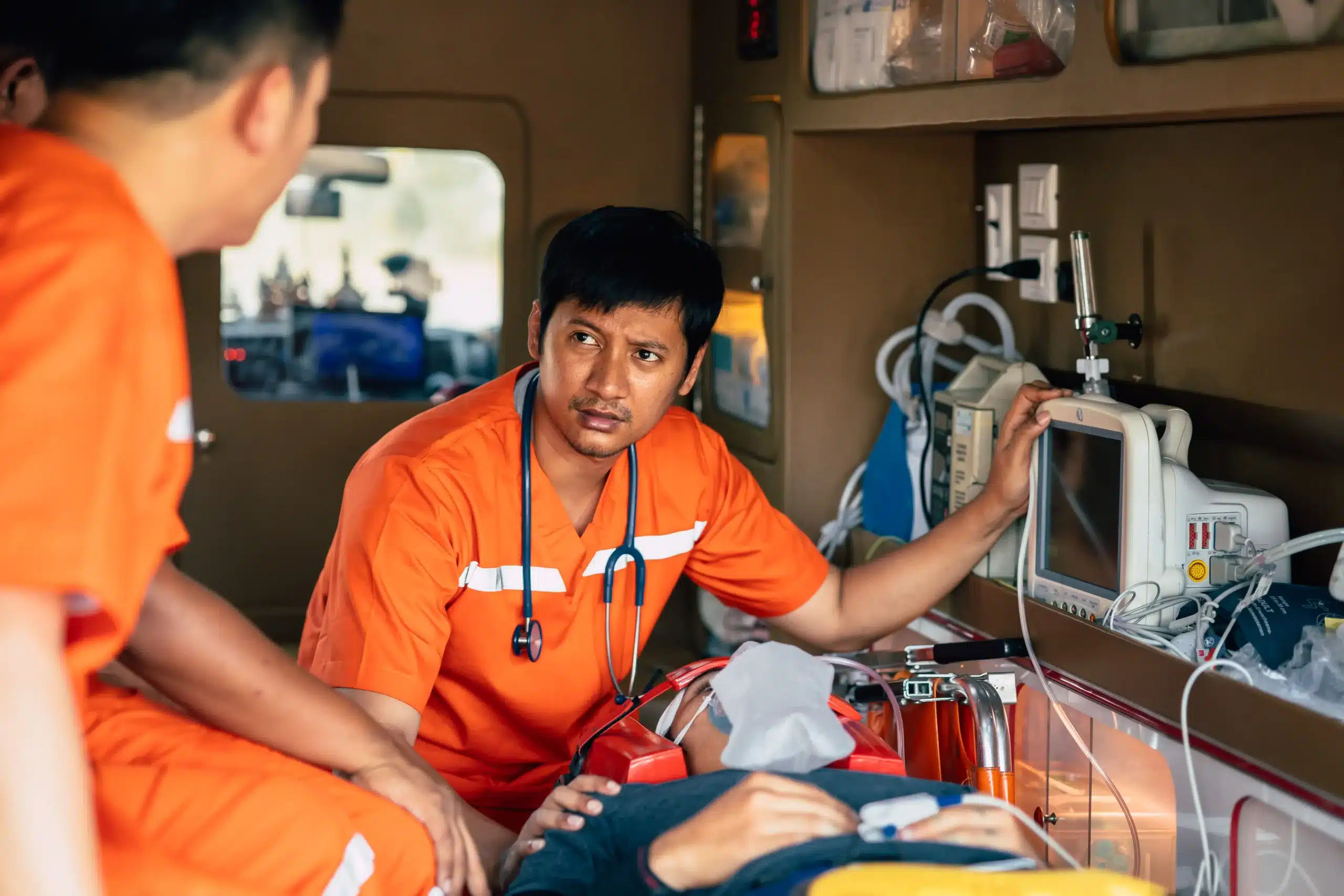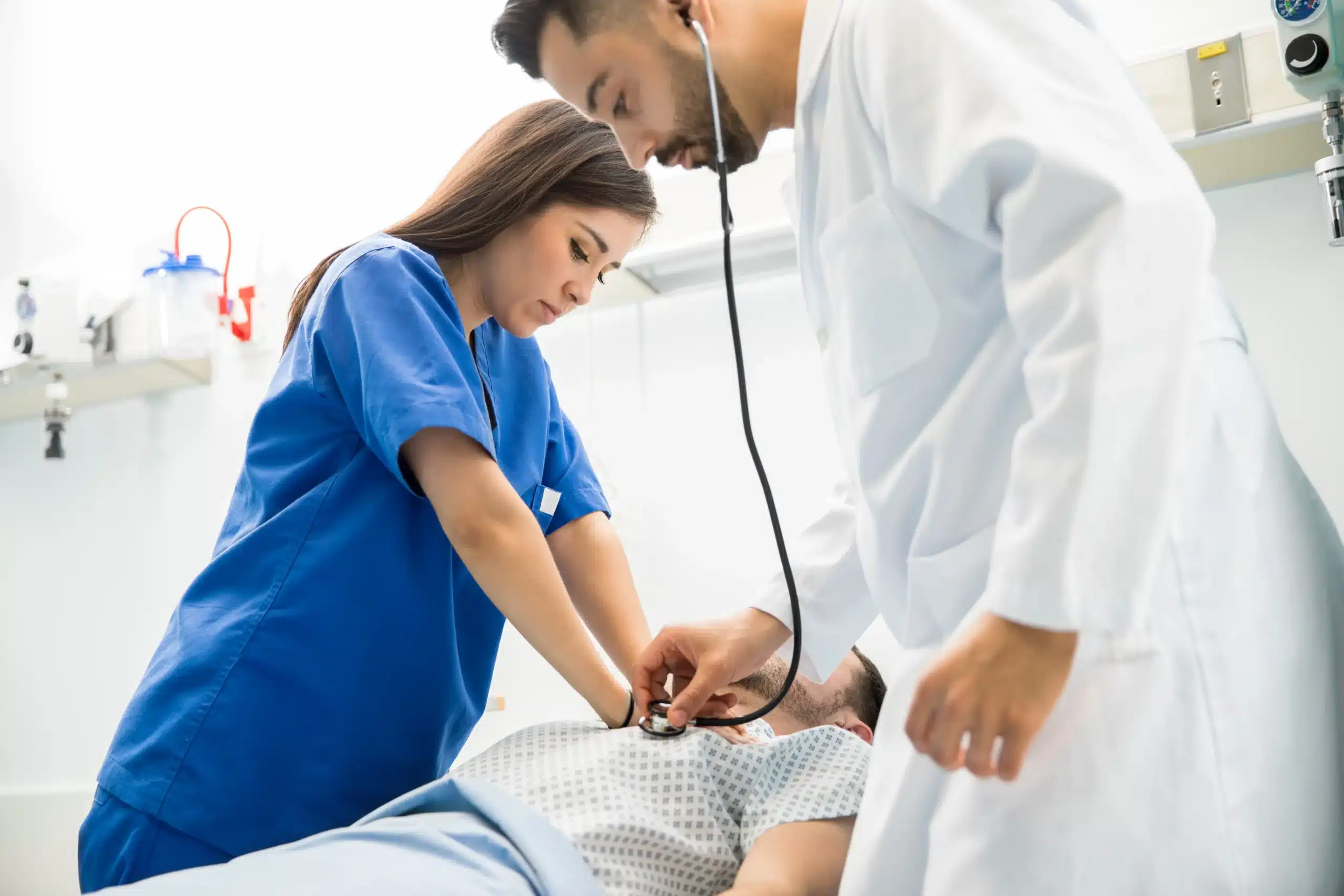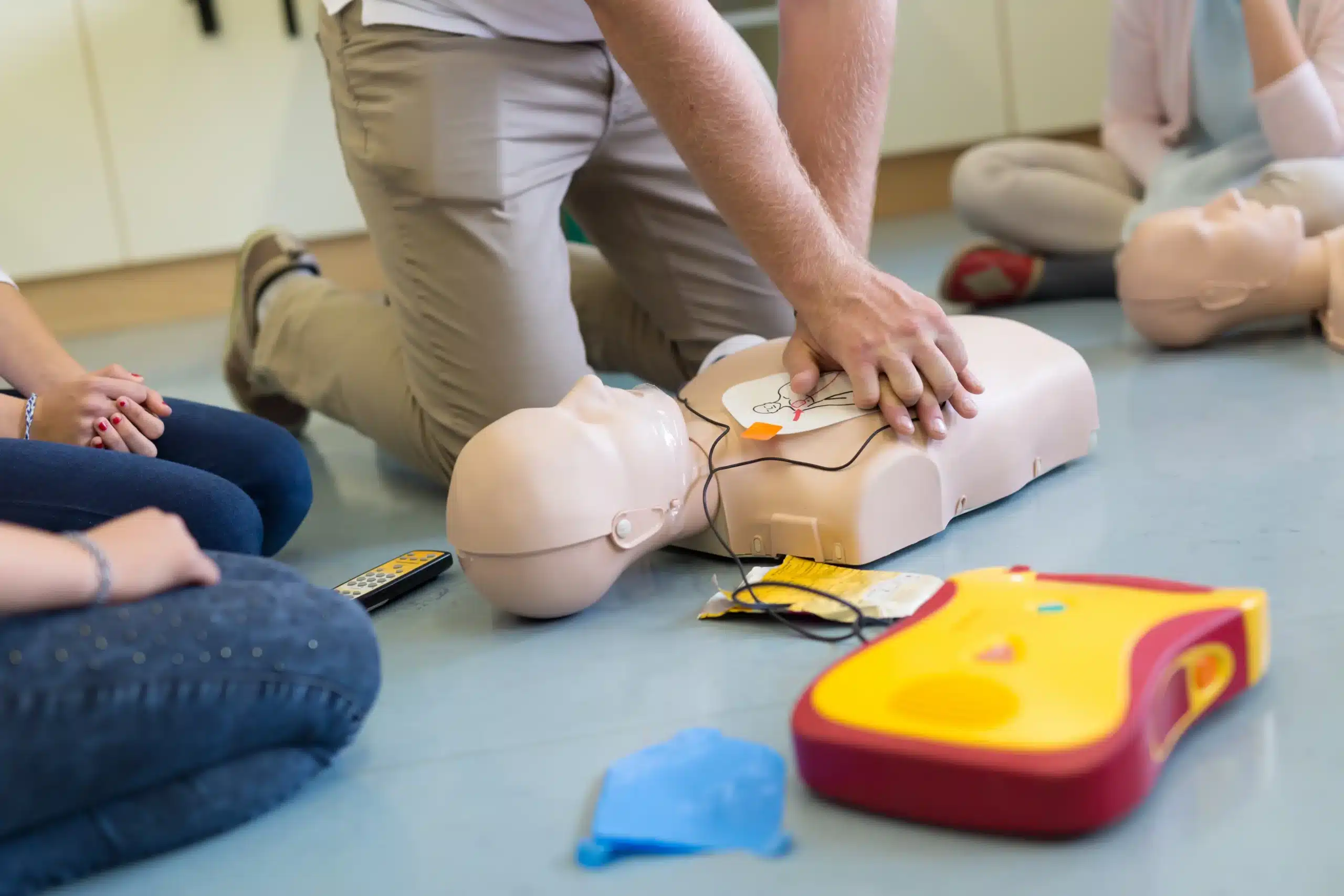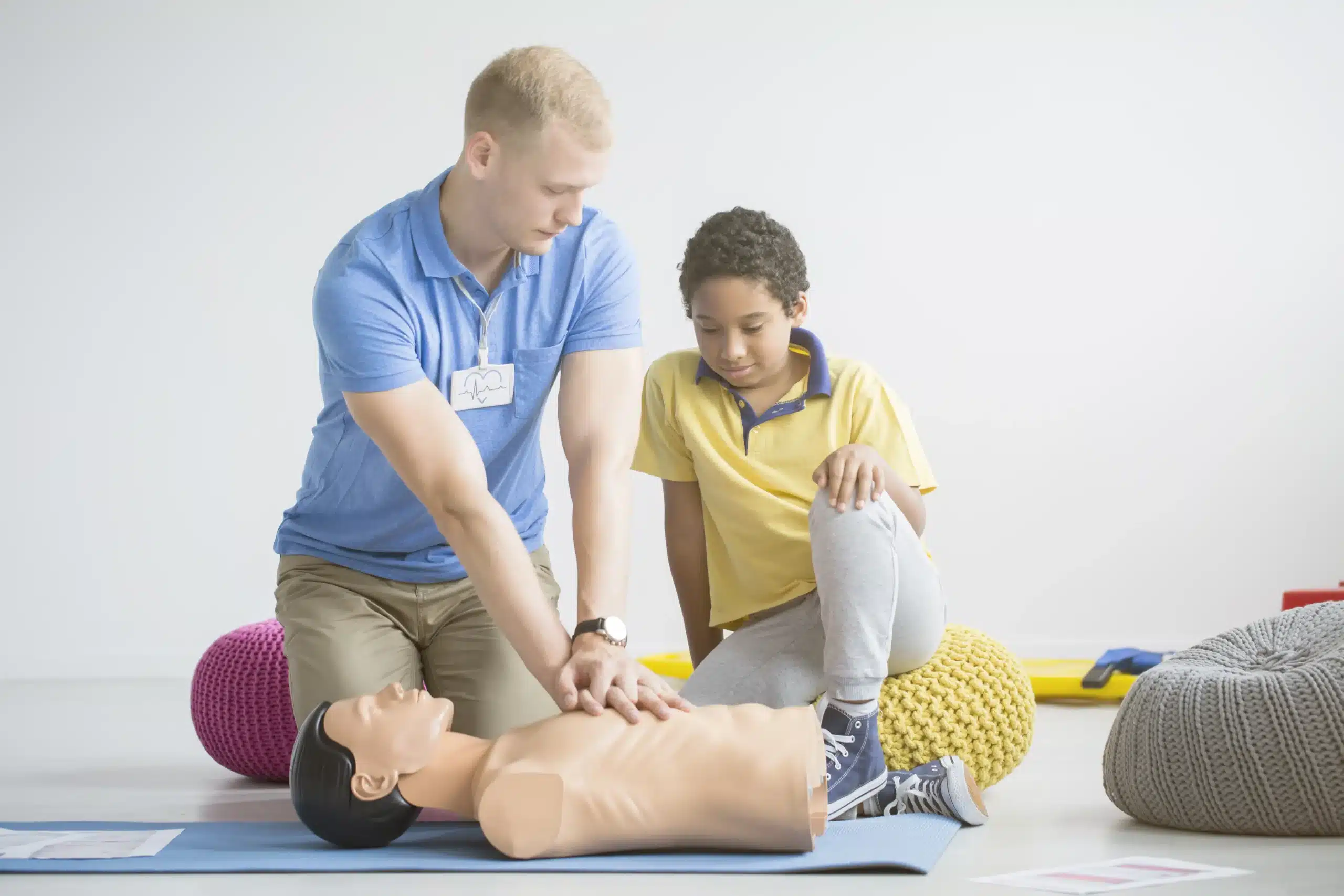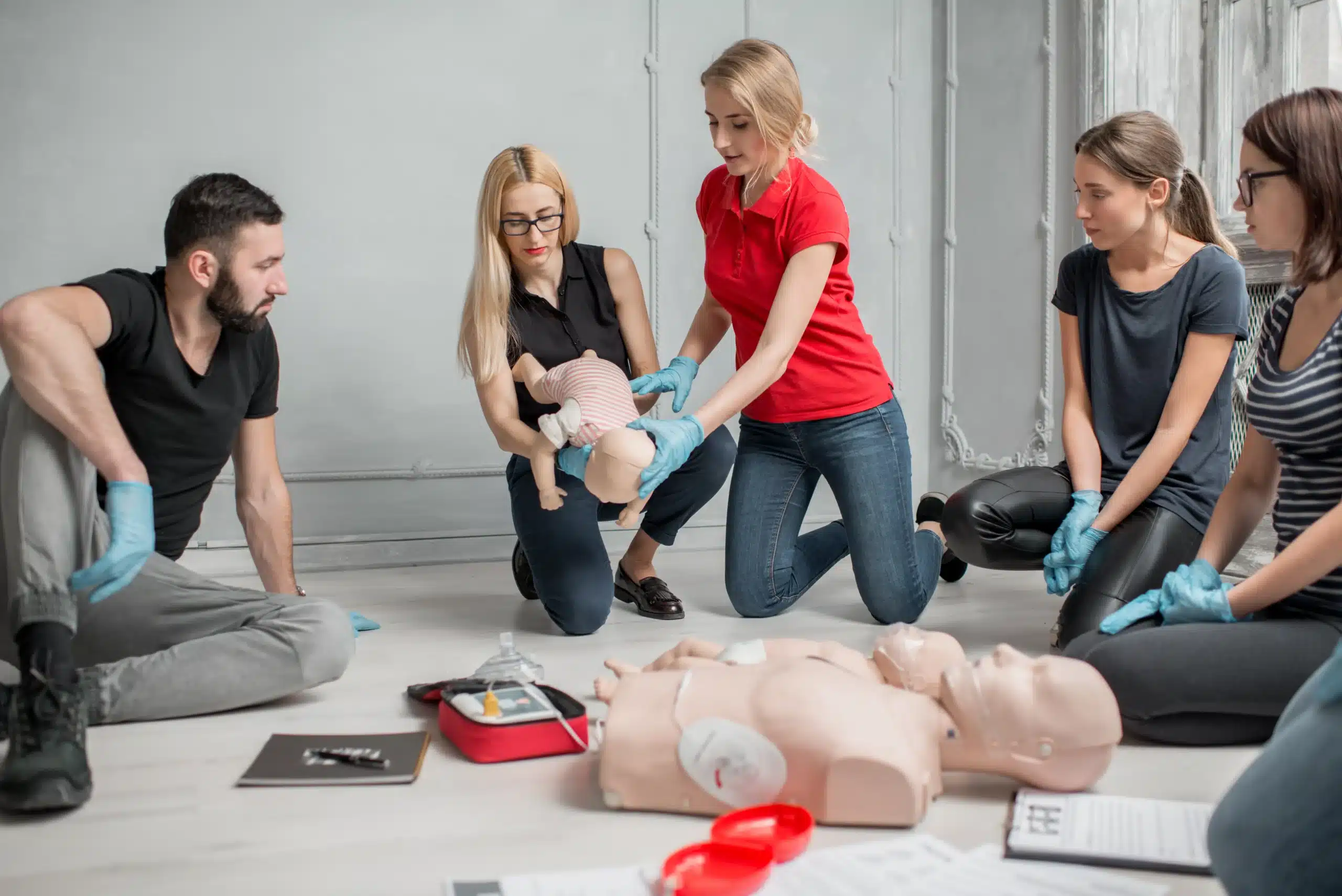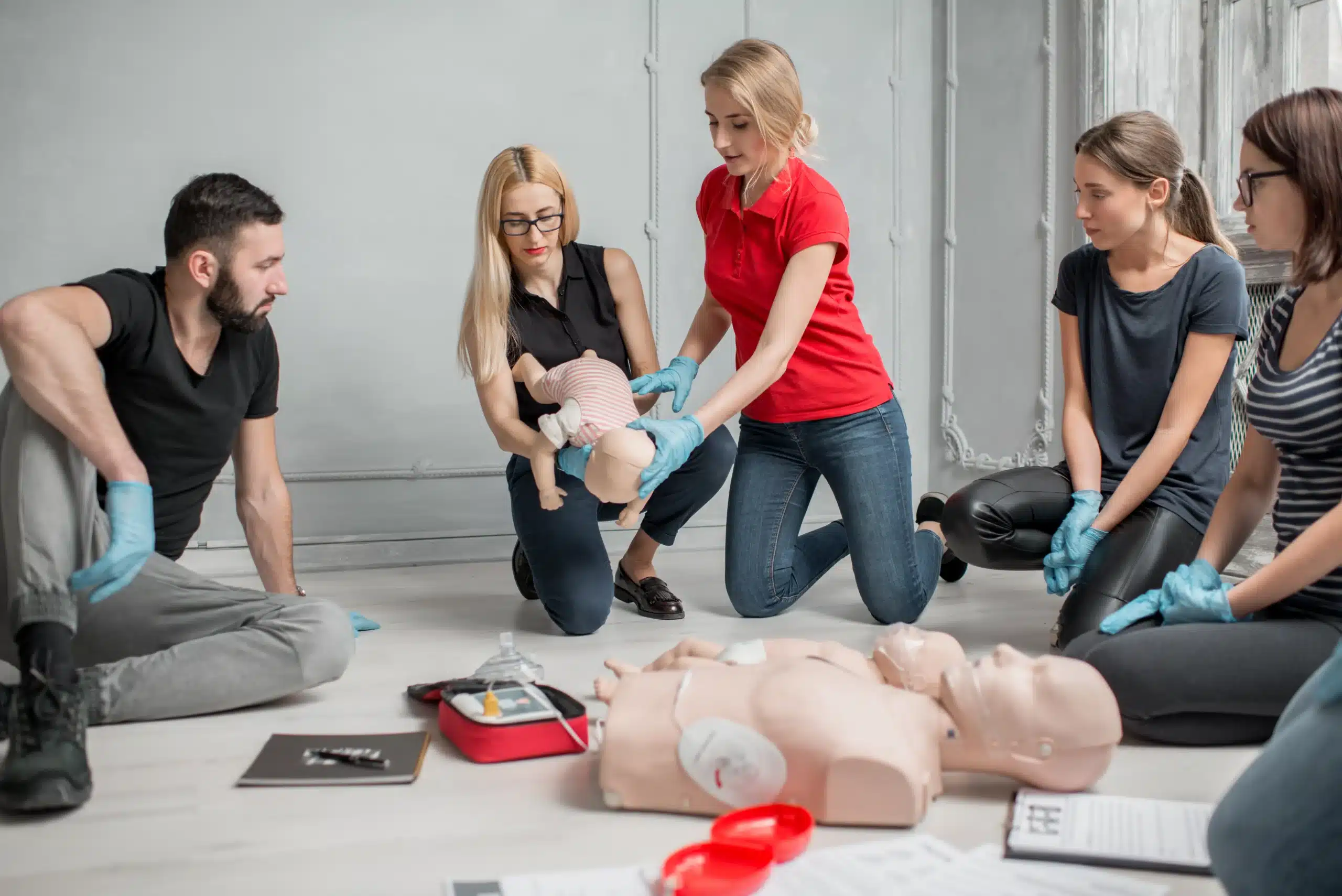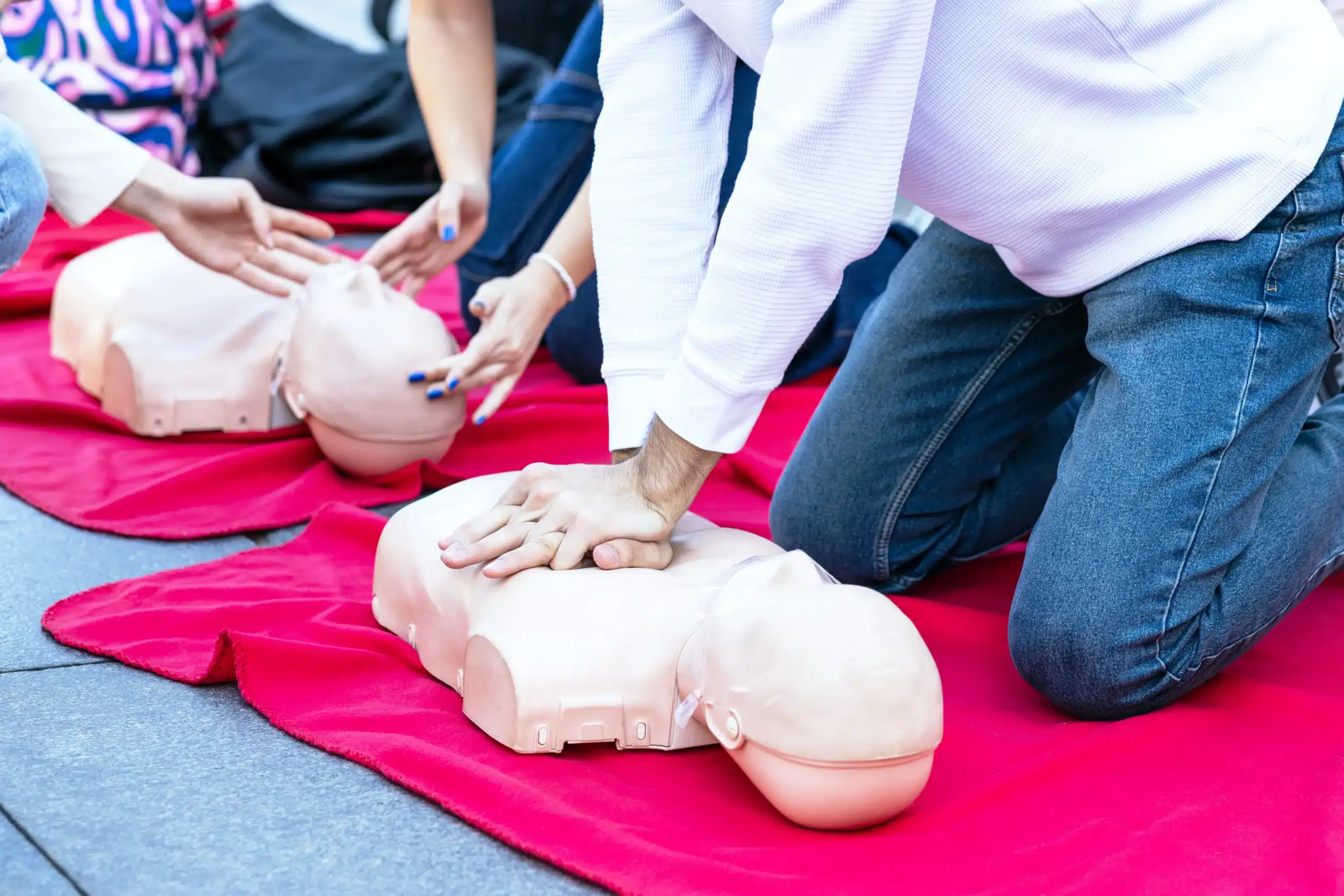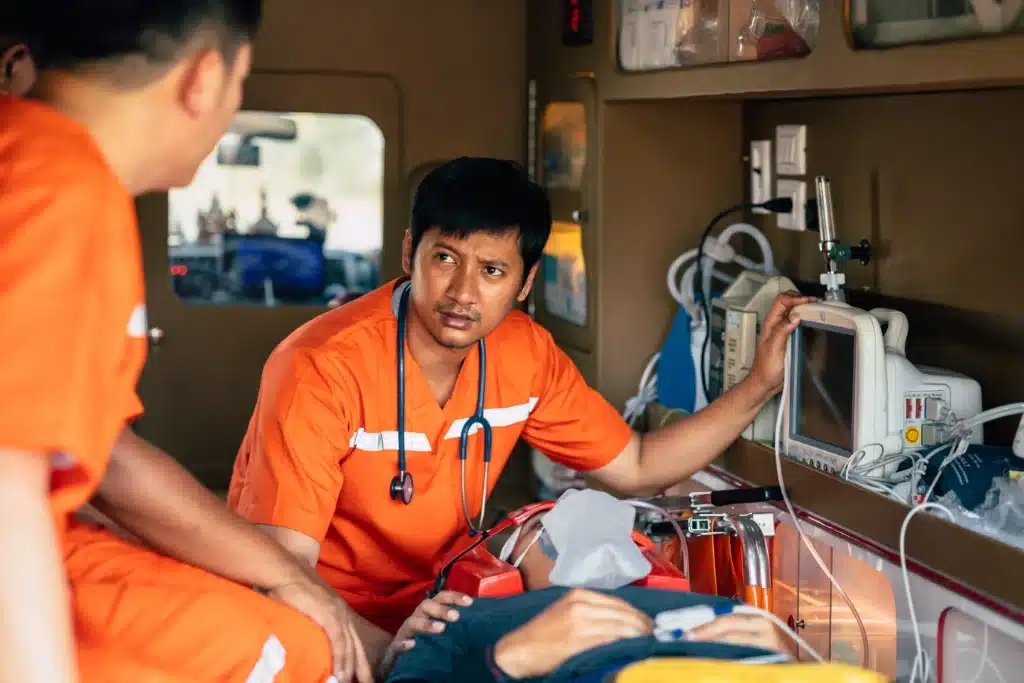Empowering yourself with life-saving skills starts with finding the right training. If you’re in Berkeley and looking for American Heart Association CPR certification, this guide is for you. We’ll demystify the various AHA courses available, including BLS, ACLS, PALS, and first aid, explaining who they’re for and what they cover. We’ll also discuss the importance of the American Heart Association’s presence in Berkeley, the value of their certifications, and how to find convenient and affordable training options near you. Plus, we’ll address common misconceptions about CPR and first-aid training, making the process less intimidating and more accessible for everyone.
Key Takeaways
- AHA certification equips you with essential life-saving skills: From healthcare providers to community members, holding an AHA certification in BLS, ACLS, PALS, or First Aid demonstrates your preparedness for emergencies. Explore the various course options, including the convenient online RQI program, to find the best fit for your needs.
- CPR and first-aid training fit your budget and schedule: With various learning formats, including in-person classes, online modules, and blended learning, you can find a course that accommodates your lifestyle. Check for group discounts and low-price guarantees to make training even more accessible.
- CPR training empowers you to act confidently in emergencies: Learning CPR builds confidence and equips you with the skills to respond effectively in critical situations. Remember, immediate action, even without formal certification, can significantly impact a person’s chances of survival.
What is the American Heart Association’s Presence in Berkeley?
The American Heart Association (AHA) plays a vital role in Berkeley by setting CPR and first-aid training standards and empowering people with life-saving skills. Their presence is evident through a network of certified training centers offering courses like BLS (Basic Life Support), ACLS (Advanced Cardiovascular Life Support), and PALS (Pediatric Advanced Life Support). These AHA programs equip both healthcare providers and the general public with the knowledge and confidence to respond effectively during emergencies. Safety Training Seminars offers AHA-certified courses that adhere to these nationally recognized standards. The AHA also supports programs like RQI (Resuscitation Quality Improvement), a flexible approach to maintaining CPR skills and certification, which is particularly helpful for busy healthcare professionals. This commitment to accessible training, reflected in both in-person and online course options, underscores the AHA’s dedication to community safety and preparedness in Berkeley.
AHA Courses in Berkeley: Your Guide
This section breaks down the key American Heart Association (AHA) courses offered in Berkeley, highlighting what each course covers and who should consider taking it. Choosing the right course is the first step towards feeling confident in your ability to respond to emergencies.
BLS
The BLS course teaches essential life-saving skills. You’ll learn CPR, how to use an AED (automated external defibrillator), and how to recognize emergencies. These skills make you a valuable asset in any situation, from the workplace to your own home. BLS certification is crucial for healthcare providers and anyone looking to improve their emergency response skills.
ACLS
ACLS (Advanced Cardiovascular Life Support) gives healthcare providers advanced skills for managing cardiac emergencies, going beyond the basics covered in BLS. This course is designed for healthcare professionals who respond to cardiovascular emergencies, such as physicians, nurses, and paramedics.
PALS
PALS (Pediatric Advanced Life Support) focuses on the specific needs of children and infants in emergencies. It’s essential training for healthcare providers working in pediatrics, including doctors, nurses, and emergency responders. The course covers recognizing and treating respiratory and cardiac emergencies in young patients.
Heartsaver CPR AED
The Heartsaver CPR AED course is for anyone who wants to learn CPR and how to use an AED, even without a healthcare background. This course empowers people to respond effectively during emergencies and potentially save lives. It’s a valuable course for teachers, coaches, parents, and anyone interested in basic life support skills. For healthcare professionals needing to maintain their certifications, the AHA offers the convenient RQI program.
First Aid
First Aid training teaches you how to manage injuries and illnesses in various situations. From minor cuts and burns to more serious incidents, you’ll learn practical skills to provide immediate care until professional medical help arrives. This course complements CPR training and is valuable for anyone, especially those working with children or in high-risk environments.
Find AHA-Certified Training in Berkeley
Finding the right American Heart Association (AHA) certified training course can feel overwhelming, but several excellent options are available in Berkeley. Whether you’re a healthcare professional needing to renew your BLS certification or a community member wanting to learn essential life-saving skills, Berkeley has a course for you. Let’s explore some of the choices.
Safety Training Seminars
Safety Training Seminars, a woman-owned AHA Training Center, offers high-quality BLS, ACLS, PALS, CPR, and First Aid courses in nearby San Pablo, serving the Berkeley area. They focus on comprehensive training, giving you the confidence to handle emergency situations. Their convenient scheduling and dedication to student success make them a popular choice.
Other Local Training Centers
Beyond Safety Training Seminars, Berkeley has other training centers offering AHA certifications. Berkeley CPR Classes provides various courses, including CPR, BLS, and ACLS, catering to both healthcare providers and the general public. With daily AHA courses available, finding a time that fits your schedule is easy. Safety Training Seminars also extends its services throughout Northern California, ensuring more people have access to high-quality AHA training.
Online Courses
For those seeking a more flexible learning experience, online courses are a great option. The AHA offers online renewal for BLS certification, allowing you to learn at your own pace. The RQI program, another online option, is particularly popular among healthcare professionals seeking a modern and efficient way to maintain their BLS, ACLS, and PALS certifications. This program focuses on continuous quality improvement, ensuring healthcare providers stay up-to-date with the latest resuscitation techniques.
Course Costs & Finances
Knowing the cost is an important part of choosing the right CPR class. Let’s break down typical costs associated with American Heart Association (AHA) courses in Berkeley and explore ways to make training more affordable.
AHA Course Pricing
In Berkeley, AHA CPR course fees generally fall around $120. This covers your online instruction, the in-person skills session, and your official AHA certification card upon successful completion. This comprehensive pricing ensures you’re fully equipped with the knowledge and credentials you need. Remember, prices can vary slightly between providers, so it’s always a good idea to check with specific training centers for their most up-to-date pricing. We encourage you to contact us for our current rates at Safety Training Seminars.
Discounts & Group Rates
If you’re training a group, whether it’s for your workplace, community organization, or a group of friends, explore group discounts. Many CPR training providers offer reduced rates for group bookings, making it a cost-effective way to empower multiple people with these essential skills. These group training sessions can be tailored to your specific needs and often provide a more interactive and engaging learning experience. For more information on group discounts, visit our website and learn about our CPR and First Aid courses.
Price Matching & Low-Price Guarantee
Finding high-quality training at a fair price is a priority. Many CPR training centers in Berkeley offer a low-price guarantee, ensuring you get the best value. Some providers also have price-matching policies. Check out our low-price guarantee for more details. Don’t hesitate to ask about these options when you’re comparing courses – it’s a smart way to save without compromising on quality.
Course Duration & Certification
How Long are AHA Courses?
American Heart Association (AHA) courses blend online learning with in-person skills sessions. The online portion typically takes between one and two hours to complete, allowing you to learn at your own pace. Afterward, you’ll attend a hands-on skills session at a convenient location, like our site in San Pablo, serving Richmond, Berkeley, and Oakland. This in-person session usually lasts about 40 minutes, where you’ll practice skills with a certified instructor. Check out our website for available CPR and First-aid courses in San Pablo.
Certification Validity & National Recognition
After successfully completing an AHA course through Safety Training Seminars, you’ll receive an AHA certification card, valid for two years and accepted throughout the United States. This ensures your skills and knowledge are current with AHA guidelines. Whether you’re a healthcare professional, childcare provider, or want to be prepared for emergencies, this certification demonstrates your commitment to high-quality CPR.
Renew Your Certification
Maintaining your CPR certification is crucial. When your certification nears expiration, the AHA offers several renewal options. You can choose an in-person course or an online renewal course, offering flexibility for your schedule and learning style. Contact us to learn more about renewing your certification and continuing your journey in providing effective CPR.
Benefits of AHA Training in Berkeley
AHA training offers distinct advantages for various groups in Berkeley, from healthcare providers to families. Let’s explore how these courses can benefit you.
For Healthcare Professionals
For healthcare professionals in Berkeley, maintaining current certifications is crucial. The American Heart Association RQI program offers a streamlined approach to BLS, ACLS, and PALS certification. This efficient program ensures your skills are up-to-date, meeting the rigorous demands of your profession. For more information about BLS courses, visit our BLS page.
For Educators & Childcare Providers
Working with children brings a unique set of responsibilities, including being prepared for emergencies. CPR and First Aid certification provides educators and childcare providers in Berkeley with the skills to respond confidently to medical situations. These courses cover essential life-saving techniques, including AED training, empowering you to act quickly and effectively in medical crises.
For the Public & Families
Learning CPR and first aid isn’t just for professionals; it’s a valuable skill for everyone. Group CPR training offers families and community members in Berkeley the chance to learn these life-saving techniques together. These courses create a supportive learning environment and build confidence in your ability to respond to emergencies. Knowing CPR can make a profound difference before professional help arrives.
Local Regulations & Career Advancement
While CPR certification isn’t always legally mandated, having this qualification can open doors. AHA certifications are nationally recognized and demonstrate your commitment to safety and preparedness. Whether you’re seeking career advancement or simply want to be prepared, an AHA certification is a valuable asset. The AHA offers flexible learning options, including online and in-person courses. Learn more about our low price guarantee on our FAQ page. We also offer the EMSA Child Care Health & Safety course. Contact us to learn more.
Prepare for Your AHA Course
Getting ready for your American Heart Association (AHA) course doesn’t have to be stressful. A little preparation goes a long way toward a smooth and successful learning experience. Here’s what you should know:
Course Prerequisites
The good news is most AHA courses don’t have formal prerequisites. Whether you’re a healthcare professional needing to renew your BLS certification or a concerned parent wanting to learn CPR for the first time, you can generally enroll directly in the course you need. The AHA offers various options for BLS certification and renewal, including both in-person and online courses. This flexibility allows participants to choose a format that best fits their learning style and schedule.
What to Bring
Keep it simple. A notepad and pen are helpful for jotting down key points during the course. Comfortable clothing is also recommended, as many courses involve hands-on practice and physical activity.
Study Materials & Resources
While pre-studying isn’t mandatory for all courses, familiarizing yourself with the material beforehand can definitely enhance your learning experience. Many courses, like CPR and First Aid, include training on how to use AEDs safely and effectively. Check with Safety Training Seminars about specific study resources available for your chosen course. For example, some courses, like BLS, have an online component you can complete before the in-person skills session. This blended learning approach often means the online portion takes 1–2 hours, and the skills testing takes 40 minutes at one of their 60+ locations. This structure allows for a comprehensive understanding of CPR techniques before hands-on practice. Knowing what to expect helps you feel prepared and confident on the day of your training.
Flexible Learning & Scheduling
Finding the right CPR class often comes down to timing and learning style. Thankfully, several options are available to fit your schedule and preferences. Whether you thrive in a traditional classroom, prefer online learning, or need a fast-track recertification option, you can find a course that works for you.
In-Person vs. Online
We offer both in-person classes and online learning modules. In-person classes provide hands-on training and direct interaction with our expert instructors. These courses are ideal for those who learn best through demonstration and practice. For those with busy schedules or who prefer self-paced learning, our online modules offer a convenient alternative. Blended learning, which combines online coursework with in-person skills sessions, is also an option.
RQI Program
Healthcare professionals looking to renew their BLS, ACLS, or PALS certification should consider the RQI program. This innovative program allows for flexible, self-directed learning and skills validation. It’s a popular choice for busy medical professionals because it allows convenient renewal without disrupting their work schedules. The RQI program ensures your certification meets the American Heart Association standards.
Daily Classes
We understand that finding time for training can be challenging. That’s why we offer CPR and first-aid classes in San Pablo daily. This frequent scheduling makes it easier to find a class that fits your busy life. Contact our customer service team to explore available dates and times. We serve the surrounding areas, including Richmond, Berkeley, and Oakland.
Physical Demands & Practical Training
CPR training isn’t just about learning the steps; it’s about developing the skills to perform them effectively in a real emergency. This involves understanding the physical demands of CPR and actively participating in realistic training scenarios. At Safety Training Seminars, we equip you with the knowledge and hands-on experience you need to feel confident responding to emergencies.
Hands-on Course Components
Our CPR courses blend online learning with essential hands-on training. You’ll practice compressions and rescue breaths on voice-activated manikins, providing realistic feedback and building muscle memory. While you practice independently, support is readily available by phone if you have questions. This approach allows you to gain confidence in a supportive, low-pressure environment.
Accommodations for Physical Limitations
We understand that performing CPR can be physically demanding. If you have any physical limitations, we encourage you to consider your abilities before enrolling. We want you to have a positive and successful learning experience. If you think the physical demands might be challenging, we’re happy to discuss options and potential accommodations. Contact us to discuss your individual needs. Rescheduling is always an option.
Active Participation
Active participation is key to mastering CPR skills. Our courses are designed for convenience and accessibility, with a mix of online learning and hands-on practice. This blended approach lets you learn at your own pace online and then apply your knowledge during in-person skills sessions. We offer various course types and flexible scheduling to fit your busy schedule. This combination of online components and hands-on training makes our
CPR Training Misconceptions
Let’s clear up some common misunderstandings about CPR training. These myths can prevent people from taking action in emergencies or even signing up for a class.
“Only Medical Professionals Can Perform CPR”
It’s easy to think only doctors and nurses should perform CPR. The truth is, anyone can learn CPR, and bystander intervention can dramatically increase the odds of survival during cardiac arrest. Immediate action is key, regardless of your background. You don’t need to be a healthcare professional to save a life. Learn more about CPR training options in San Pablo.
“CPR Always Saves Lives”
Movies and TV shows often portray CPR as a guaranteed lifesaver. While CPR is a crucial intervention that can significantly improve survival rates, it’s important to have realistic expectations. CPR doesn’t always lead to a full recovery, but it buys precious time until professional help arrives. Understanding this helps people approach CPR training with a clear understanding of its potential impact.
“CPR Certification is Required”
Many hesitate to help in an emergency, believing they need to be certified to perform CPR. While CPR certification demonstrates a commitment to training and best practices, it isn’t legally required to perform CPR in an emergency. Acting quickly with even basic CPR can make a difference. Taking a class is always recommended, but don’t let the lack of formal certification stop you from helping someone in need. Our low price guarantee makes training accessible to everyone.
“Mouth-to-Mouth is Always Necessary”
The idea of mouth-to-mouth can make some people uncomfortable performing CPR. Current American Heart Association guidelines often prioritize compression-only CPR. This method focuses solely on chest compressions and can be just as effective, especially for bystanders. This simplifies the process and encourages more people to act quickly in emergencies. Contact us to learn more about our CPR courses.
Related Articles
- Online CPR Classes in Berkeley: Your Complete Guide – San Pablo CPR Classes
- Advanced Cardiac Life Support (ACLS) in Berkeley – San Pablo CPR Classes
- PALS Certification in Berkeley: Your Comprehensive Guide – San Pablo CPR Classes
- BLS Certification in Berkeley: Your Complete Guide – San Pablo CPR Classes
- BLS for Healthcare Providers in Berkeley: A Complete Guide – San Pablo CPR Classes
Frequently Asked Questions
What if I have a busy schedule and can’t commit to a traditional CPR class? We offer various learning options, including online modules and blended learning, which combines online coursework with shorter in-person skills sessions. We also offer the RQI program, a flexible option for healthcare professionals needing to renew their certifications. Daily classes are available in San Pablo, making it easier to find a time that works for you.
I’m not a healthcare professional. Is CPR training still relevant for me? Absolutely! CPR and first-aid skills are valuable for everyone, from parents and teachers to community members and workplace responders. Knowing these skills can empower you to act quickly and potentially save a life in an emergency. We offer courses designed for people of all backgrounds, with no prior medical experience required.
How much do the courses cost, and are there any discounts available? Course costs vary, but we offer a low-price guarantee and often have group discounts. Contact us directly for the most up-to-date pricing information and to inquire about discounts for your group or organization. We believe that cost should not be a barrier to learning these essential life-saving skills.
What does an AHA certification mean, and how long is it valid? An American Heart Association (AHA) certification signifies that you have completed a course meeting their rigorous standards for CPR and other life-saving skills. These certifications are nationally recognized and valid for two years. We offer various AHA-certified courses, ensuring you receive high-quality training that meets industry standards.
What if I have physical limitations? Can I still participate in the training? We strive to make our training accessible to everyone. If you have physical limitations, we encourage you to contact us to discuss your specific needs. We’re happy to explore potential accommodations or alternative training options to ensure you have a positive and successful learning experience.
